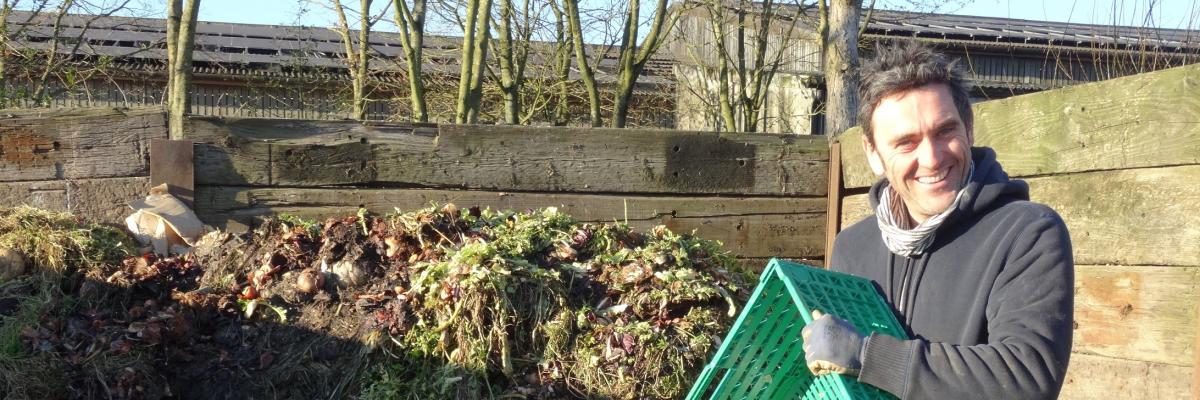
Jez Taylor
Grower
The market garden at Daylesford is placed on a gentle, south-facing slope with 6 polytunnels and is located adjacent to the main restaurant/shop/farm complex; a 20 acre field at the heart of the Daylesford Estate. The garden is divided by 10 m fruit tree lined grass avenues forming a grid of land blocks in which the vegetable crops are rotated. Around the garden periphery we have smaller pieces of ground for 2 acres of soft fruit, orchard strips, an acre of polytunnels, and the various infrastructure necessities; packing shed, compost heaps, borehole, water storage tank and propagation area.
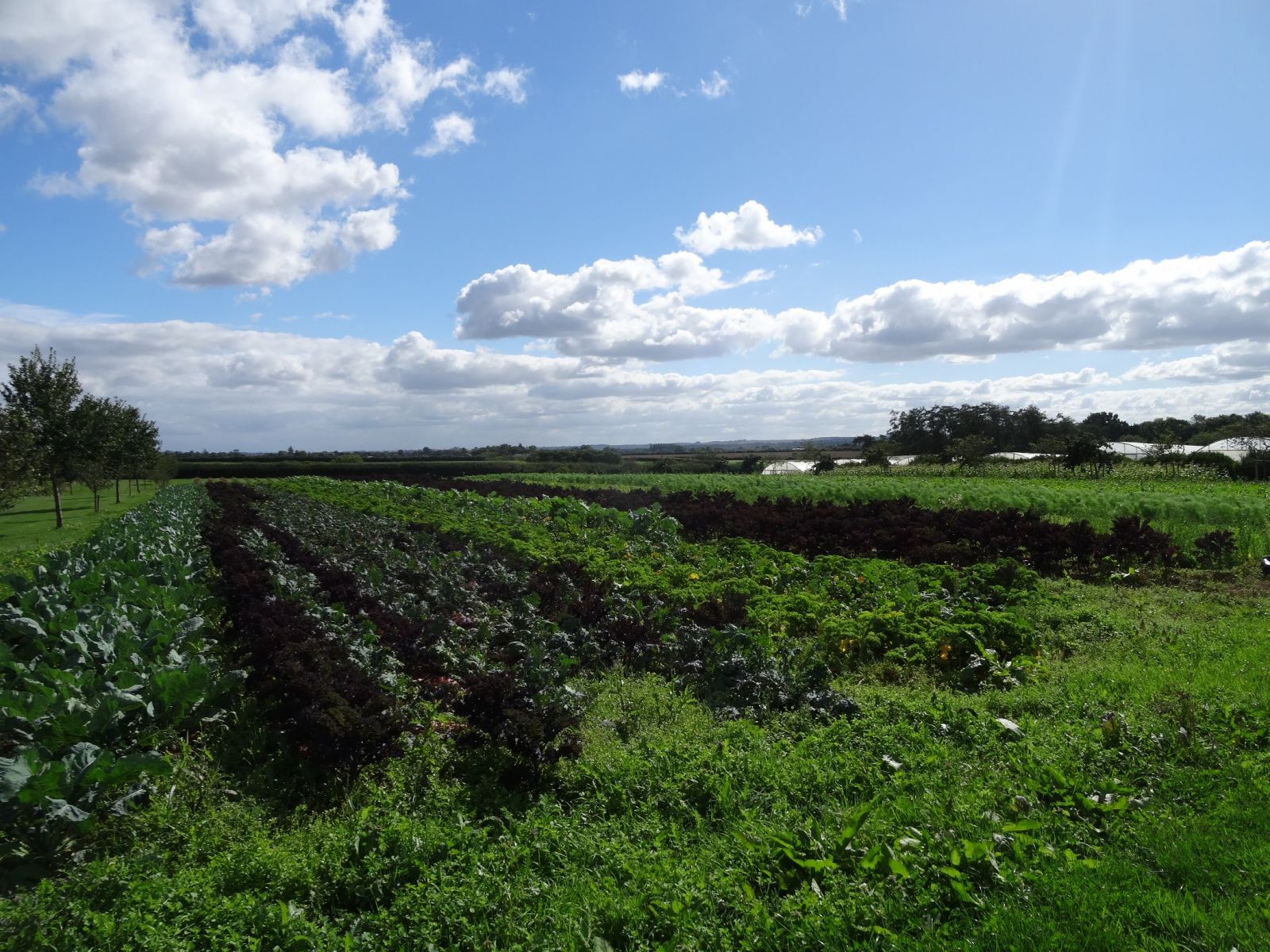
The remit of the market garden is to grow as wide a selection of fruit and veg for the retail/catering enterprise as possible. The market garden site is flat and fairly well drained, but this part of the Cotswolds has none of the microclimate advantages of the vale of Evesham or other horticulturaly famous regions such as Kent. Diverse horticulture however, is practicable anywhere; what works is a matter of trial and error.
Over the course of the year we produce over 70 different crop products. One of our guiding strategies has been that if a crop can only be harvested by hand, then we can probably make money from growing it. That said, we still always grow a few tonnes of onions and potatoes each year because they are relatively easy to grow, though we have significantly reduced the volume of carrots we grow as the hand weeding can be hard to get right in the height of the busy growing season.
.jpg)
Photo credit: Jez Taylor & team
We are committed to organic production so rotations are key. To maintain fertility, we utilise manure from the farm’s livestock, and vegetable waste is collected from the Daylesford production units, cafe and restaurants to produce compost. We grow over 300 varieties of organic fruit, vegetables salad leaves and herbs, including many unusual and heritage varieties. This means we can provide a steady, wide ranging supply of fresh produce throughout the year.
.jpg)
Photo credit: Jez Taylor & team
As well as producing an incredibly diverse range of fruit and vegetables, we are able to ensure that this produce is used to its fullest in the Daylesford farm shop, restaurants and cookery school. The market garden also supplies the Daylesford food production units where our produce is used in ready-to-cook and takeaway meals, soups, jams and chutneys. By owning the entire value chain we can demonstrate the journey from farm to fork to our customers.

Diverse market gardening
Twelve years on, our annual cropping plan is now a well-rehearsed 52 weeks of activity, with a handful of tweaks each new season. Each year a third of the growing plots have well-rotted farm yard manure or compost applied between March and June, just prior to cultivation. This added fertility helps support 3 years of cropping, starting with nutrient hungry crops such as brassicas / potatoes, then successively less hungry crops such as onions/ salads, then legumes / deep rooting carrots / parsnips.

Photo credit: Jez Taylor & team
Because the garden is an ornamental as well as productive space (used as a venue for events, tours and cookery school participants), long term fertility-building green manures are hard to justify. Soil fertility is key to our reputation and success, so phacelia and rye are used whenever possible at the end of the season to protect soil over the winter.
Rotation is the cornerstone of making the most of our precious farmyard manure. We also make compost on site from a combination of crop residues from the tunnels and kitchen waste. The ready meal kitchen alone will contribute half a tonne of veg waste a week. With eggshells from the pastry department and coffee grounds from the café, we have the ingredients for useful potting compost. This is made by putting 9-12 month old well mixed compost through a riddling machine, thus fulfilling 2 thirds of our annual compost requirements; 8 tonnes.

The Daylesford brand is based around seasonal produce. Seasonal produce is by its very nature the most environmentally sound to grow. We use polytunnels to create more Mediterranean conditions so we can grow the summer fruiting crops, and to improve growing conditions in the cold season. We always chose varieties/types that can grow without supplementary heating of the tunnels, e.g. chervil rather than parsley, endive rather than lettuce. Regular conversations with the head chefs ensure that these substitutes are supported in the kitchens and make it on to the seasonal menus. This can work both ways, beetroot grows brilliantly here and the chefs can celebrate this most when we grow pink and golden varieties. The same goes for kale (we grow 6 varieties), a much easier brassica to grow than caulis and cabbages.
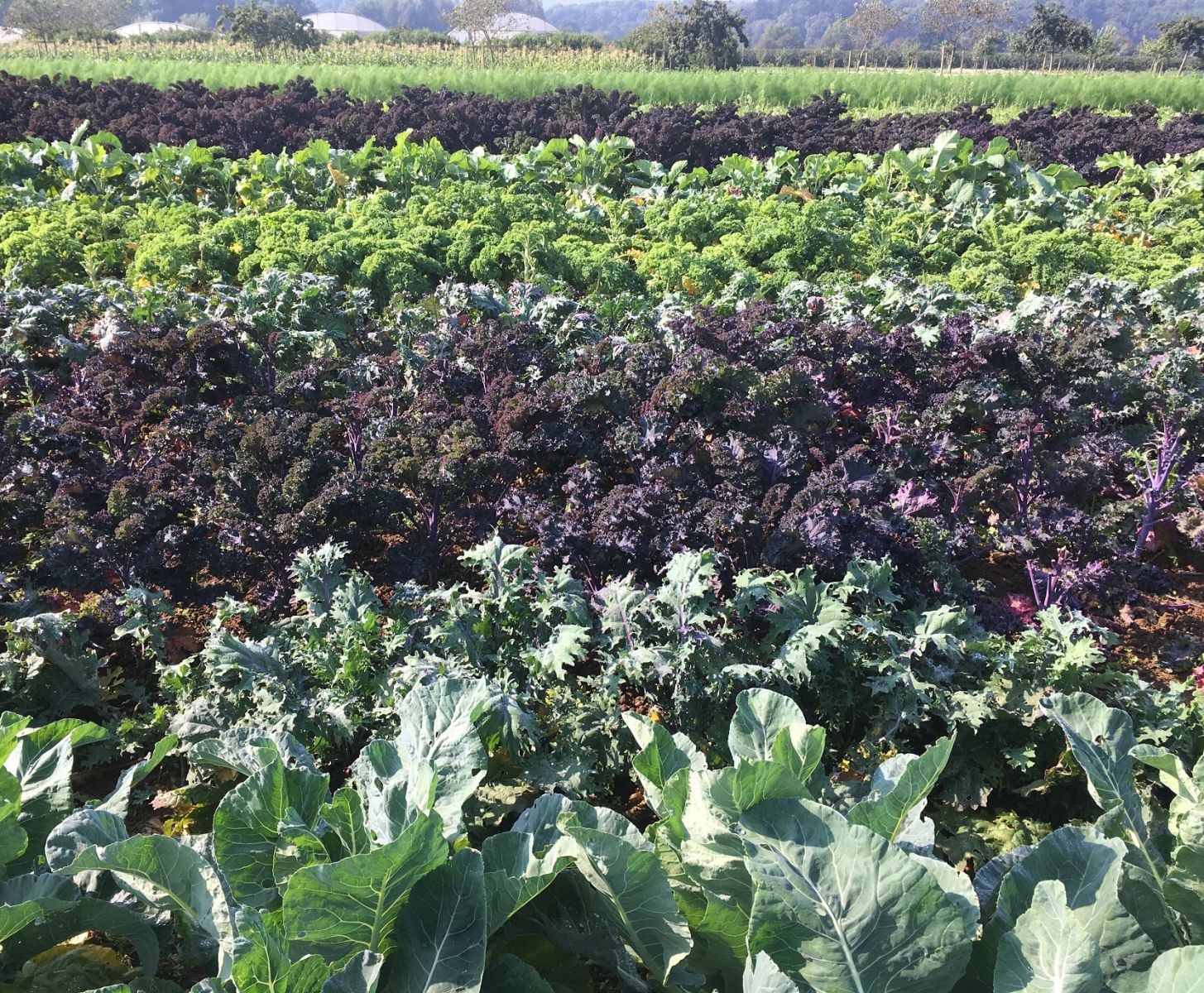
Photo credit: Jez Taylor & team
70% of what we produce is for kitchens. We have very little wastage, the best looking produce goes to our retail shelves, everything else goes to the kitchen staff, who are mainly concerned with freshness.
During glut season (June to November), we have a preserves kitchen. At the beginning of the year a calendar of production is created to match the gluts of the market garden; strawberries, tomatoes, blackcurrants and plums being particularly important. This helps minimise waste further, and the legacy of the previous season remains in kilner jars on shop shelves, also incorporated into winter menus, making Daylesford dishes always unique to the farm.
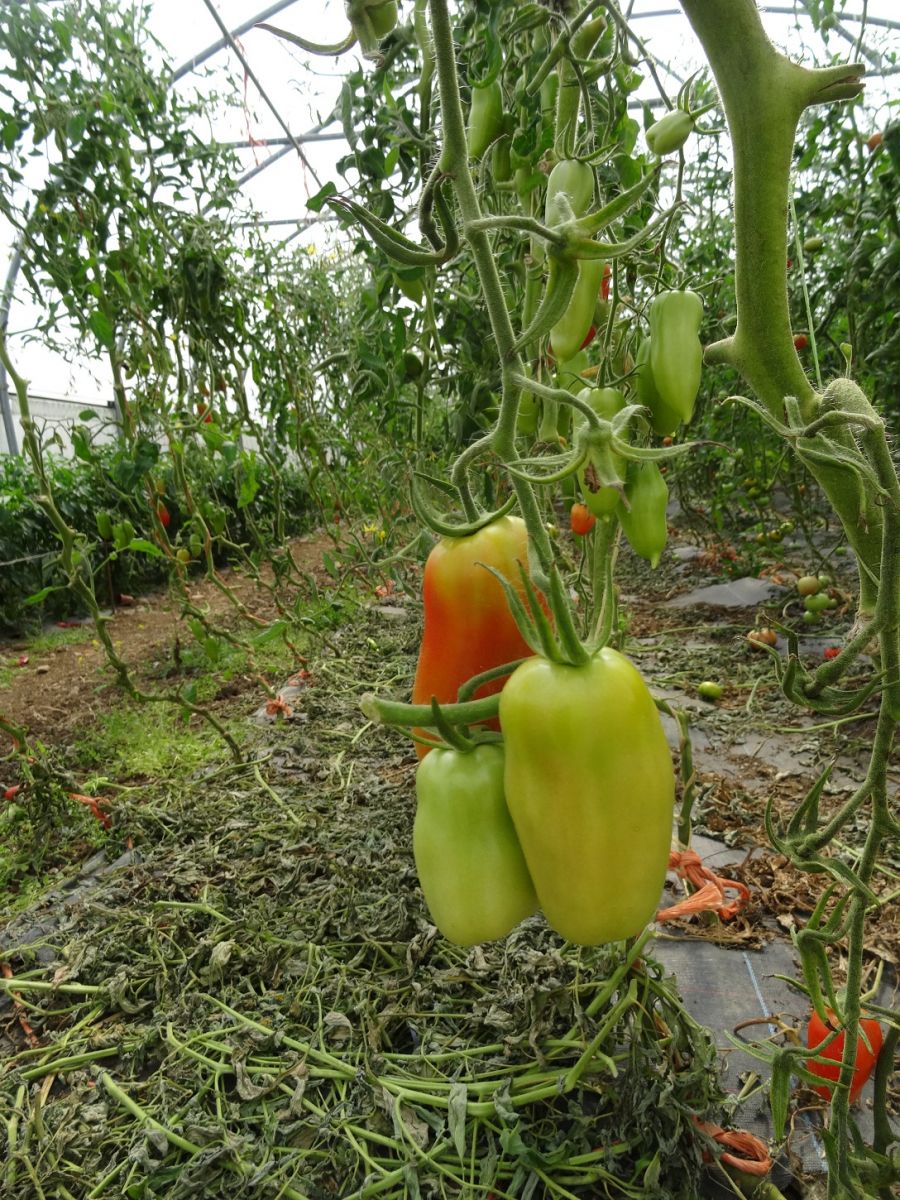
Diversity of customers and the varieties / crop types we grow makes the most of what we can produce and protects us from the worst of what the season can throw at us.
Having a market place on our doorstep also allows us to go beyond just growing produce. We raise herb, veg and salad plants for our 4 shops in the spring / early summer, forage over 2,000 bunches of wild garlic in our quiet season, pick and press over 10 tonnes of apples in October / November for our cider, and make at Christmas over 100 fresh door wreaths from evergreen material we find on the estate. All this makes the most of our workforce and facilities, meaning I can employ as many people as possible, which generally means that work is easier (at least for me as I get older!).
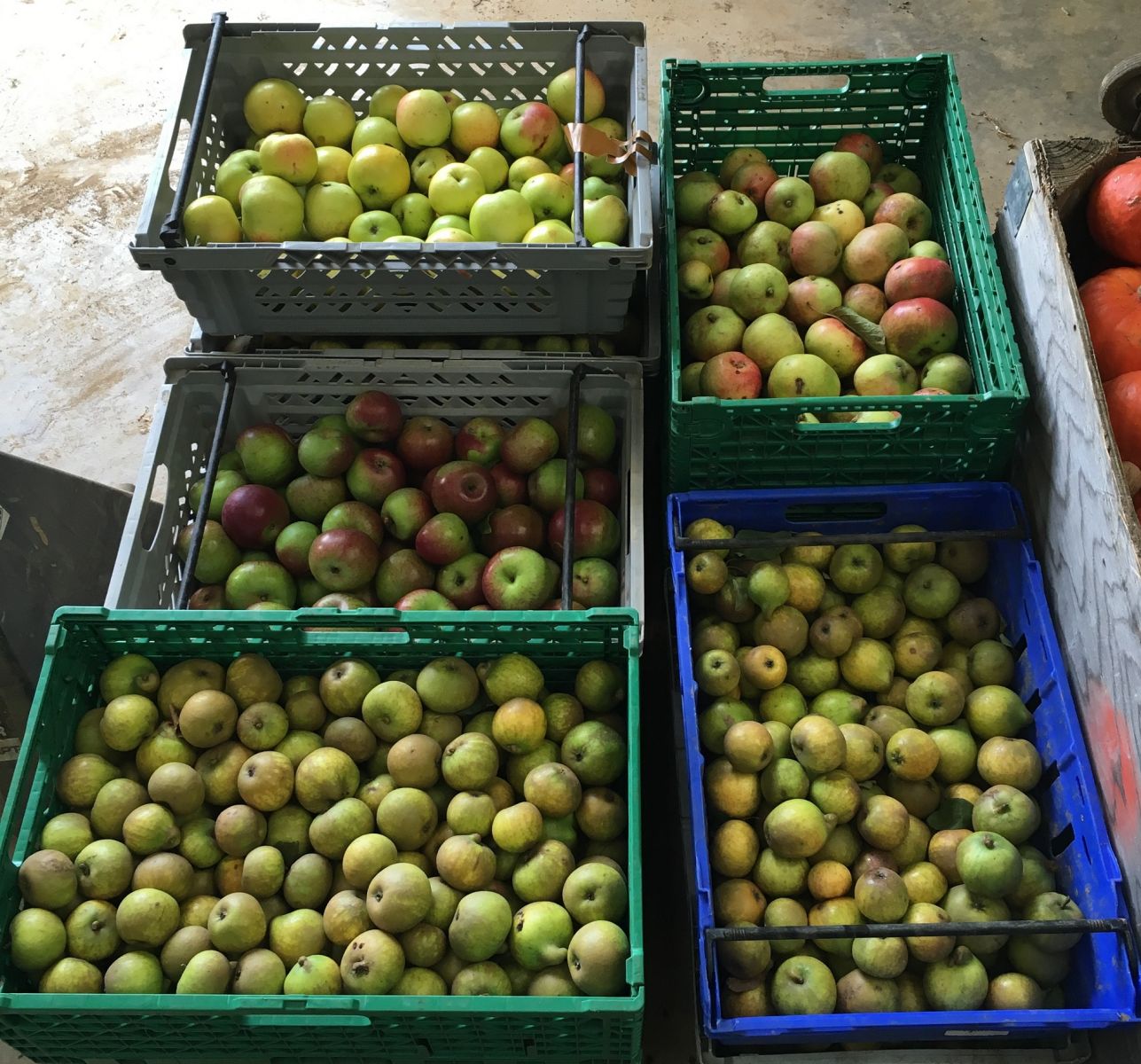
I’m convinced that diverse market gardening is good for the soul. In the world of trying to find a perfect lifestyle, market gardening offers you the opportunity to be very physical, have access to great food, and it doesn’t have to be mind-numbingly boring. We always try to divide the market garden tasks in to at least 3 different blocks of work each day.
With polytunnel and propagation jobs needing frequent attention, we rarely have to be out in the worst of weathers, and big jobs such as hand weeding are always tackled with a big gang of us to make the work less daunting. All this helps for an enjoyable work experience. I only let people work here who actually want to work here, and who appreciate the produce. I make sure that people can take home as much produce as they like to help them get enthused about it. It’s that enthusiasm that is exactly what the foodie culture at Daylesford is all about.
.jpg)
Growing up in a hanging basket nursery in the Vale of Evesham, I was initiated into the world of horticulture from a young age. My interest in organic farming also started as a youngster. I was a keen pony rider and while out riding I noticed hedgerows being ripped out and gallops being converted into arable fields. I couldn’t stand seeing the countryside being destroyed. I realised that farming was impacting negatively on the environment I grew up in, affecting the wildlife as well as the people around me. People tell me that this is a reality of modern commercial farming but we need to realise what we’re missing out on as a result.
At school I was encouraged to become a food technologist but after a year out WWOOFing on organic farms, and a month of food technology at university in Reading, I realised that I wanted to produce food.
As a sociable character, I knew a lot of people in Reading who owned bars and restaurants. They were all very excited about the mixed leaf salad I started growing. Before I knew it I had an acre and a half of land, and a box scheme. As things developed, I took on another walled garden, a regular stall at Reading Farmer’s Market and developed a cider business back in Evesham.
In 2007, I took a consultancy job for the Eden Project to set up a market garden, but it was complicated - the ground was very acidic and there were problems setting up a commercial operation on the Eden site. The Head Grower position came up at Daylesford in 2008 and I decided to go for it.
My inspiration comes from people like David Blake at Worton Organic Garden, running a mixed small-scale operation, growing produce and flowers and diversifying in to having a little café. It’s a really great example of small is beautiful - whatever he does he can communicate quickly with his customers and that’s what impresses me. They have a really secure, loyal customer base and can sell their produce at top dollar.
So for me, rather than thinking about expanding in to more land, I believe it’s better to intensify; which means more polytunnels to improve our year-round production and produce more summer fruit crops (tomatoes, peppers, cucumbers). Also, despite loving the seasonal pleasure of carrots and parsnips, I think diversifying in to cut flowers will be a more lucrative use of the space, and if that’s what the market wants and we can grow it (and talk about it /Instagram it), then that’s what the market will grow.
That’s what makes the new breed of growers different from the old school 70s growers - for them it was all about carrots, for us it’s about pretty leaves!
Photo credits for all not listed: Rachel Lewis

